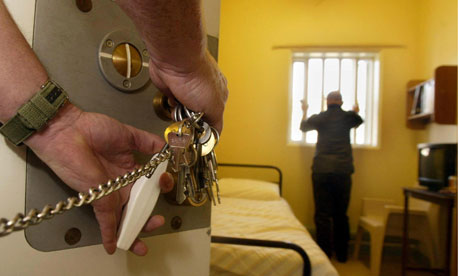By Madeline Schiesser
Impunity Watch Reporter, Europe
LONDON, U.K. – Following an appeal by several British prisoners to the European Court of Human Rights (ECHR) due to their lack of enfranchisement, the ECHR ruled that the U.K.’s blanket ban against prisoner voting was illegal (see Hirst v. United Kingdom). In May, the ECHR gave the British government until this Friday to comply with its ruling. However, many members of Parliament, including Prime Minister David Cameron, are strongly opposed to giving prisoners the vote.

Presently under Section 3 of the Representation of the Peoples Act, there is a blanket ban preventing those serving prison time from voting. However, prisoners awaiting trial, fine defaulters, and those held for contempt of court are still permitted to vote.
The 2005 ruling of the ECHR found this blanket ban to be a violation of human rights, and has demanded that at least some prisoners be enfranchised. However, the Court did not rule that all inmates need to be given the right to vote. Rather, individual countries can consider factors such as severity of crimes and duration of sentence when writing policies on which prisoners may vote. However, a total ban is illegal.
Nevertheless, Prime Minister Cameron, most Tories, and even some Labour members are decidedly against any legislation that would enfranchise prisoners. Popular opinion is also strongly opposed to such a move.
Last month, Prime Minister Cameron told members of Parliament: “No one should be under any doubt – prisoners are not getting the vote under this government.”
Chris Grayling, the Secretary of State for Justice, last month cautioned against ignoring the ECHR’s ruling, because such would be “a significant step outside th[e] international commitment [of the European Convention of Human Rights].” He further warned that while other countries have disagreed with the ECHR before, “if we send a message that says we will stand up to the court, where does that leave countries in other parts of Europe that perhaps have less good human rights records than we do?”
Attorney General Dominic Grieve has also stressed the importance of complying with the ECHR’s ruling, saying that it imposes an international legal obligation on the U.K.
As the ECHR’s Friday deadline approaches, Parliament has drafted a bill that some BBC sources claim on Thursday will be voted on after it is outlined by the justice secretary. The bill gives MPs three options with which to address prisoner voting.
Under a first option, Parliament could outright refuse to give prisoners the vote, as it did in February 2011 in a vote of 234 to 22. This would place the British government in violation of international law and therefore Article 46 of the Ministerial Code. Furthermore, the ECHR could fine the government for failure to comply. Prisoners who feel that they should have been enfranchised under the Court’s ruling could also make bids for compensation.
Under a second option, voting rights would be extended to prisoners serving prison sentences of up to 6 months.
Under a third option, voting rights would be extended to prisoners serving prison sentences of up to 4 years.
Current speculation is that if a vote does take place, the blanket ban would likely be upheld. However, Parliament hopes that by discussing the issue, it will have met the ECHR’s Friday deadline, even if a vote this week does not enfranchise any prisoners.
Shadow home secretary Yvette Cooper suggests maintaining the ban, but also working with the ECHR to determine narrowly what voting laws would be acceptable. “You have to keep going back to the European Court on this because I think the job of the European Court is to look at what is proportionate, what is responsible,” she explained. “We haven’t passed laws on this before, even though we have passed motions, and I think when we do so, the European Court should look at it again.”
However, there are also those in the U.K. who question Parliament’s reluctance to allow prisoners the vote. Juliet Lyon, director of the Prison Reform Trust, asked: “Is it wise for the government to flout international law, face a substantial fine and millions in mounting compensation claims, ignore the advice of its attorney general, prison governors, bishops to, and inspectors of, prison, and take up Parliamentary time and taxpayers’ money in order to stop sentenced prisoners from acting responsibly by voting in democratic elections?”
For further information, please see:
The Guardian – UK Rejection of the ECHR’s Ruling on Prisoners’ Votes would be Devastating – 21 November 2012
BBC News – Prisoners’ Vote: MPs to Decide on European Ruling – 19 November 2012
BBC News – Votes for Prisoners – Opening the Door? – 19 November 2012
BBC News – Prisoner Vote Bill to be Outlined – 18 November 2012
The Independent – Parliament to Consider Giving Prisoners Votes as European Ruling Deadline Looms – 18 November 2012
The Telegraph – Tories will Change Relations with European Courts After Prisoner Vote Row, says Justice Secretary – 28 October 2012
BBC News – Prisoners will not get the Vote, Says David Cameron – 24 October 2012